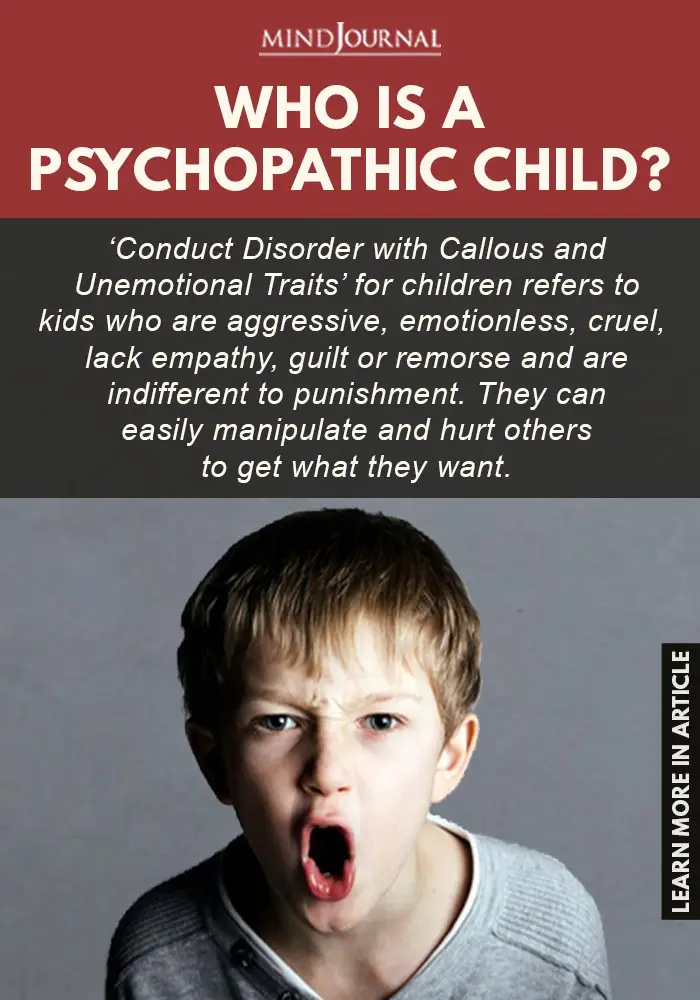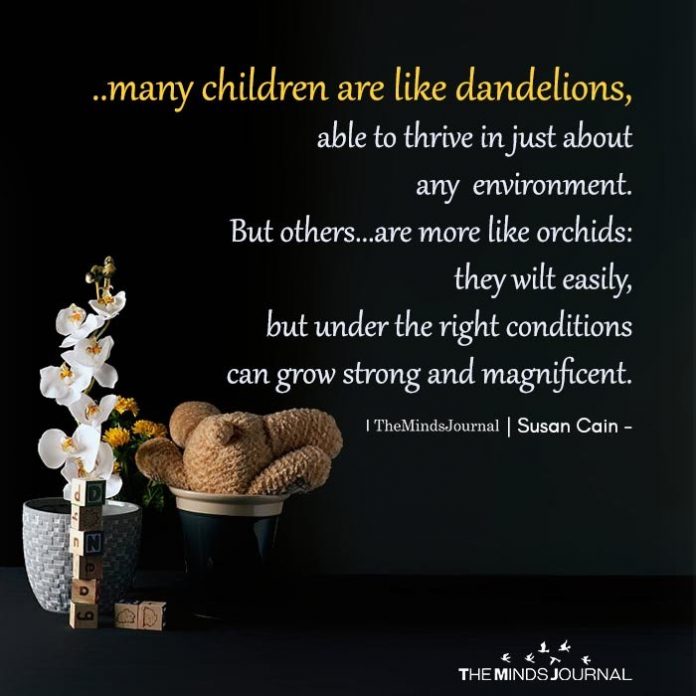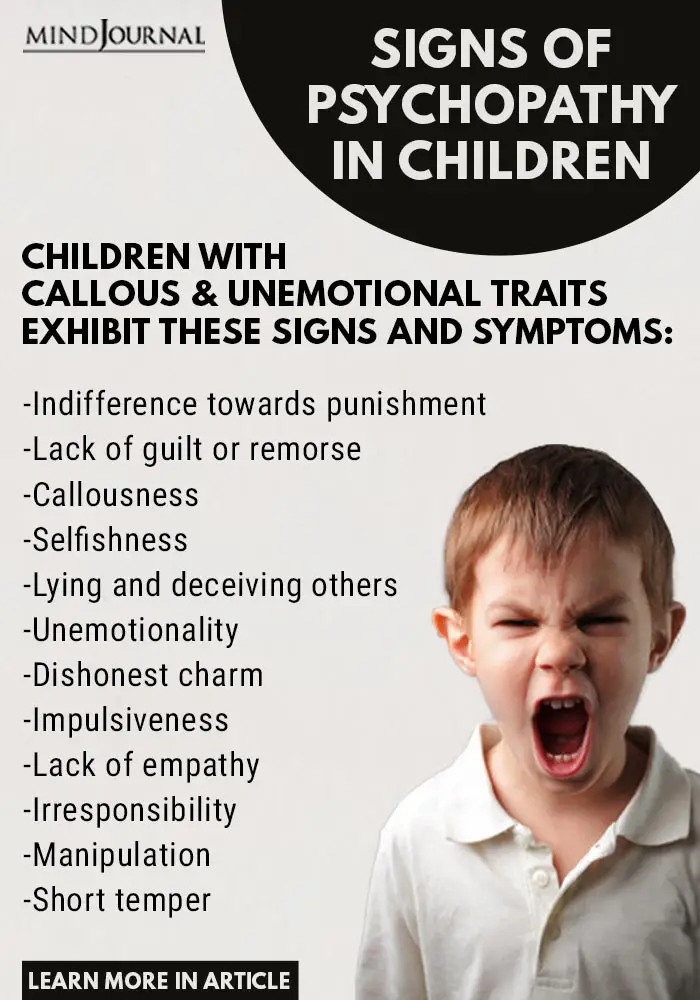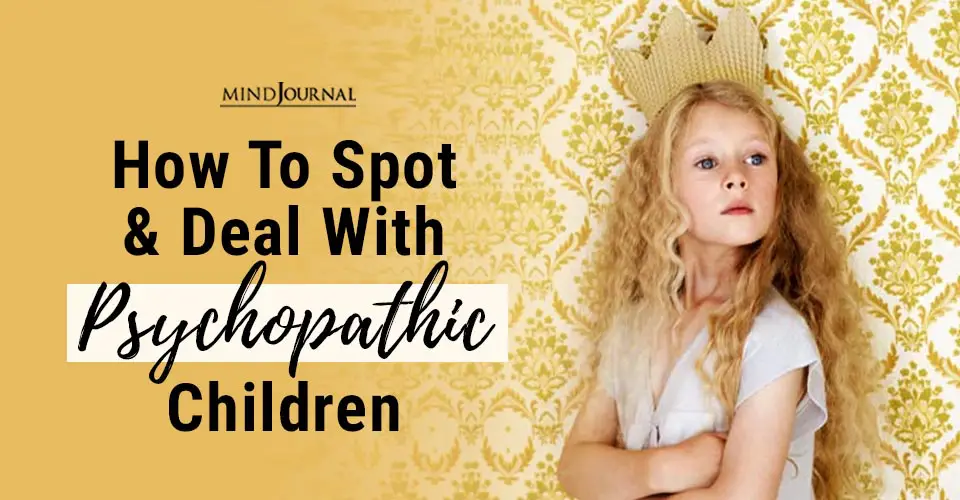Is your child showing psychopath behavior? Do they show signs of narcissism? Psychopathic children often lack empathy & remorse and can be highly uncaring, unemotional and mean.
Although most kids can be cruel at times, it doesn’t mean that they are antisocial. When it comes to children and psychopathy, there is no straight “yes” or “no” answer. Psychopathy is believed to be a continuum and we can observe certain elements in all children to some degree.
Can children be psychopathic?
If you are worried that your child may be a psychopath, then the first thing you need to know is that psychopathy is not an official mental illness. The term is widely used to explain a group of behaviors and traits that show an individual is cruel, uncaring and callous. This pattern is mostly identified as Antisocial Personality Disorder in psychiatric terminology.
Psychotherapist and bestselling author Amy Morin, LCSW explains that back in 2013, the American Psychiatric Association (APA) included the “condition ‘Conduct Disorder with Callous and Unemotional Traits’ for children ages 12 and over in its diagnostic manual, DSM-5. It’s a serious condition that reflects interpersonal deficits.” Such behavior can often be associated with dangerous behaviors.
Read also: Is Your Kid A Narcissist? How You May Be Creating Narcissistic Children
Author Barbara Bradley Hagerty writes “Researchers shy away from calling children psychopaths; the term carries too much stigma, and too much determinism.” Professor Stephen Scott of the Institute of Psychiatry at King’s College London says that this condition in children is “largely unrecognised”. He adds “We don’t like using the word psychopath in under 18s, but there is a high continuity to becoming a so-called antisocial personality disorder with psychopathic traits.”
But psychopathic children with “callous and unemotional traits” are known to be aggressive, emotionless, cruel, lack empathy, guilt or remorse and are indifferent to punishment. Barbara adds “Callous and unemotional children have no trouble hurting others to get what they want. If they do seem caring or empathetic, they’re probably trying to manipulate you.”
What science says about psychopathic children

Psychopathy is not necessarily bad. In fact, having psychopathic and narcissistic traits in small doses can actually be helpful. Most business leaders and successful politicians are known to have narcissistic traits. However, when such traits are present in an extreme combination, then it can lead to the formation of a harmful antisocial individual.
Read also: What To Do When Your Children Manipulate You?
Studies show that around 1% of children exhibit antisocial traits during their childhood. This can enable parents to identify signs of psychopathy when they are adults. But it can often be difficult for parents to identify psychopathic children as these kids can be highly smart and charming. They can imitate social cues to mask the warning signs and appear “normal”.
But these statistics can actually be higher than what current research shows. “Since mental health providers don’t use the label psychopath, however, the exact numbers aren’t known,” explains Amy Morin. Most of the mental health diagnoses often overlap with signs of psychopathy. Psychopathic children are often misdiagnosed with the oppositional defiant disorder, writes Amy. She adds “Then, during their teen years, they may be diagnosed with conduct disorder, which involves a persistent pattern of violating the rights of others and disregarding basic social rules.”
As a result, most children do not get the right treatment and often grow up to be dangerous adults. Barbara writes “More than 50 studies have found that kids with callous and unemotional traits are more likely than other kids to become criminals or display aggressive, psychopathic traits later in life.” However, researchers claim that a psychopathic child is not necessarily destined to become a murdering lunatic. It has been observed that 4 out of 5 children with callous and unemotional traits do not show any signs of psychopathy when they grow up.
This is why it is crucial to spot the signs of psychopathy in children early on and offer them help and treatment so that they can grow up to be decent human beings. According to a 2017 study, “A thorough knowledge of family interactions, easily available for paediatricians, is crucial for early identification as well for a therapeutic alliance with parents and children.”
Read also: How To Save Children From Narcissistic Abuse and Toxicity

Warning signs of psychopathic children
According to a 2016 study by Rebecca Waller and colleagues at the University of Michigan, signs of psychopathy in children can be observed as early as 2 years of age. The researchers found that psychopathic children with Deceitful-Callous (DC) behavior tend to show the following 5 signs:
- The child does not feel guilty after misbehavior
- The child is selfish, mean and is least likely to share.
- The child is highly prone to lying and deceiving others
- The child exhibits sneaky behavior and often gets around the parent(s)/guardian(s)
- The child’s behavior is not affected by punishment
“Children’s behavior problems were indicated by items such as getting into fights, destroying toys and other objects, and having temper tantrums,” explains Susan Krauss Whitbourne, Ph.D., ABPP, a Professor Emerita of Psychological and Brain Sciences at the University of Massachusetts Amherst. She adds “The findings revealed that by age three, toddlers who were rated high on the DC scale developed into children with significant behavior problems.”
The fact is, an antisocial, psychopathic child often shows similar characteristics as a psychopathic adult. Amy Morin, LCSW writes “The telltale signs of psychopathy involve a disregard for others’ feelings and a complete lack of remorse.”

The Youth Psychopathic Traits Inventory (YPI), one of the widely used assessments, generally considers the following symptoms to measure personality traits and symptoms of psychopathy is a child:
- Unemotionality
- Callousness
- Manipulation
- Remorselessness
- Lying
- Dishonest charm
- Irresponsibility
- Impulsiveness
- Thrill-seeking behavior
- Grandiosity
Moreover, adolescents with psychopathic and antisocial tendencies may team up with similar-minded peers to engage in illegal activities in groups.
Read also: Loneliness In Children: This Is What You Can Do As A Parent
According to Professor Stephen Scott of the Institute of Psychiatry at King’s College London, a parent must watch out for these additional signs if they believe their child might be antisocial and psychopathic:
1. Lack of empathy
Professor Scott says that by scanning brains of psychopathic children, it has been observed that “the amygdala, which is where you acknowledge emotions and process them, (and) it’s completely quiet and flat. So they will understand what is going on, but they don’t care.”
2. Lack of guilt
“They will be very selfish for their own needs,” explains Professor Scott. However, this particular trait can often make them great business leaders as they can take the most difficult decisions without feeling remorse.
3. Certain obsessions
Psychopathic children are often fascinated and captivated by certain things, such as technology and gadgets.
4. Bad temper
The professor explains that callous and unemotional children may do something nice for their parents or siblings for a few moments. “But it won’t last,” warns the professor. When their demands are unmet or their family members cross them, psychopathic children “will lose it very quickly and get very angry,” adds Professor Scott.
Read also: Anxiety In Children: 15 Calming Things You Can Say As A Parent
What makes a child psychopathic
Once you identify the signs that your child may be psychopathic, the first question that comes to a parent’s mind is “why?” Unfortunately, the answer may not be so black and white according to researchers. According to the studies, psychopathy is usually a result or either nature or nurture. It is usually a result of a complicated combination of family dynamics, genetics and even life experiences.
Dysfunctional family and social environment can often lead to the development of callous and unemotional traits. Psychotherapist Amy Morin explains “Children who have been physically abused, neglected, and separated from their parents are more likely to become psychopaths.” Most children are not born as antisocial, psychopathic narcissists. Author Barbara Bradley Hagerty writes “Many experts suggest that if they’re given a reprieve from their environment, they can be pulled back from psychopathy’s edge.”

However, genetics also have a role to play when it comes to callous and unemotional traits in children. Many children with psychopathic tendencies are often raised in safe neighborhoods and loving parents. Numerous studies conducted across the United Kingdom have revealed that the early-onset of antisocial behavior in children is largely hereditary. It is mainly hardwired in their brain and can be often challenging to treat. It has been found that their “brains react differently to fear, sadness, and negative stimuli,” explains Amy Morin. Psychopathic children also have a hard time recognizing the emotions of others.
Read also: How to Raise Emotionally Intelligent Children: 3 Crucial Lessons To Teach
In an interview with The Atlantic, Adrian Raine, psychologist at the University of Pennsylvania, says “We’d like to think a mother and father’s love can turn everything around. But there are times where parents are doing the very best they can, but the kid – even from the get-go – is just a bad kid.”
How to deal with psychopathic children
Most parents often find themselves lost when dealing with psychopathic children as it is mostly a hushed up topic. “So little is known about how these kids operate. This is uncharted territory,” explains Dan Waschbusch, a researcher at Florida International University. He adds “People are worried about labeling, but if we can identify these kids, at least we have a chance to help them. And if we miss that chance, we might not get another one.”
So how can a parent or caregiver help a child with callous and unemotional traits? Here are a few ways to help psychopathic children:
1. Therapy
Apart from giving sufficient attention and time to their children, parents also need to focus on getting individual therapy to help their antisocial child. “Individual therapy that focuses on developing impulse control, emotional regulation skills and empathy is crucial, though not enough, to solidify real positive change,” explains licensed clinical psychologist and author Seth Meyers, Psy.D.
Specialized treatment that focuses on their unique cognitive, emotional & motivational patterns can greatly help children with psychopathy traits. As they are mostly unresponsive to punishment and traditional methods of discipline, residential treatment programs focusing on reward-based interventions can prove to be effective. Research has found that interventions which compel kids to earn privileges depending on good behavior, can positively impact their thoughts, intentions, behavior and actions. Teaching emotion recognition, empathy, prosocial behavior, strategies to cope with frustration and anger can also help these children.
Read also: 4 Most Common Symptoms Of Depression In Children
Psychotherapist Amy Morin, LCSW explains “If you’re seeing signs that cause you to question whether your child might be a psychopath, it’s important to seek professional help. A pediatrician or mental health professional can assist in assessing, diagnosing, and treating your child.”
2. Medication
Apart from therapy, medication may also be beneficial for adolescents with such traits. Although there are no specific medications for the treatment of the symptoms of antisocial and psychopathic behavior, it may be a part of the overall treatment process. Antipsychotic medication, mood stabilizers and other medications can help to reduce aggression in children and help with emotional dysregulation. “There is a wide range of possible medications that can help to calm and slow down the individual whose impulses take them from 0 to 60 in a matter of seconds,” adds psychologist Seth Meyers, Psy.D.
Parents with psychopathic children must visit a pediatrician, general practitioner or a psychiatrist immediately after identifying the warning signs to start psychiatric assessment and possible treatment.
Read also: 7 Things You Need To Teach Your Children About Love And Life
Treatment can help
You need to remember that simply because your child lacks empathy or lies at times, it doesn’t necessarily mean that they are psychopaths. This is why identifying the signs is crucial before labeling your child as an antisocial or a narcissist. But if you believe that your child’s lack of remorse and callousness is a normal behavior pattern and it’s getting worse, then visit a mental health professional immediately.
“Whether you believe it’s nature or nurture that causes a person to become a psychopath, early recognition of these behavior problems is vital to altering that child’s ultimate path through life,” concludes Susan Krauss Whitbourne, Ph.D., ABPP.
Read also: Conscious Parenting: The Art Of Raising Happy Children
Here is an interesting video that you may find helpful:









Leave a Reply
You must be logged in to post a comment.